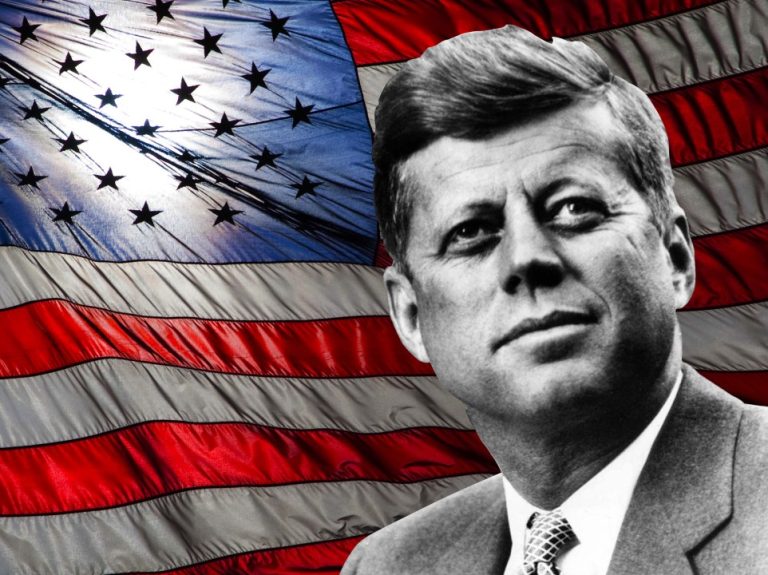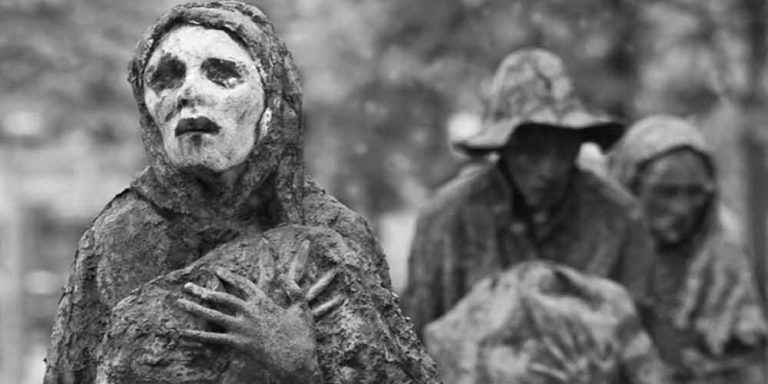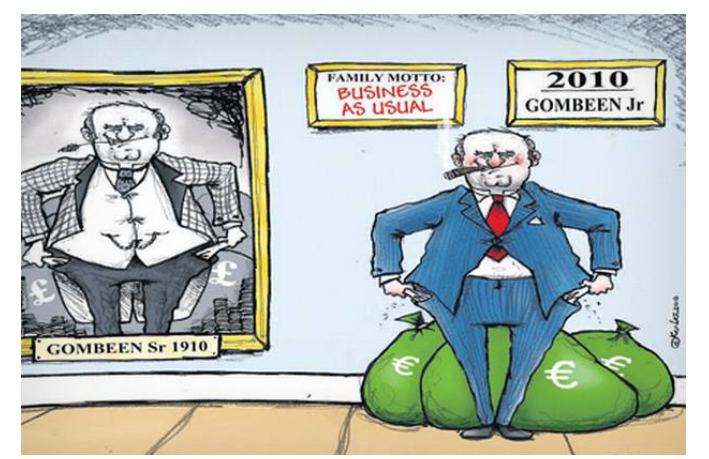
In the dark heart of Ireland’s history, there’s a figure so vile, so insidious, that his name alone conjures images of betrayal, greed, and the slow strangulation of a nation’s soul.
The Gombeen man. A term spat with venom, whispered in disgust, and hurled as an insult that cuts deeper than any blade. To understand the Gombeen man meaning is to peel back the layers of Ireland’s suffering, to expose the festering wound of a nation sold out by its own.
This is no mere slang; it’s a curse, a condemnation of those who’d rather fatten their wallets no matter what the cost.
And today, in 2025, the Gombeen man is back, more ravenous than ever, feasting like a gluttonous pig on Ireland’s housing crisis, peddling globalist agendas, and tearing apart the very fabric of community for a fistful of euros.
Gombeen Man Meaning: The Anatomy of a Parasite
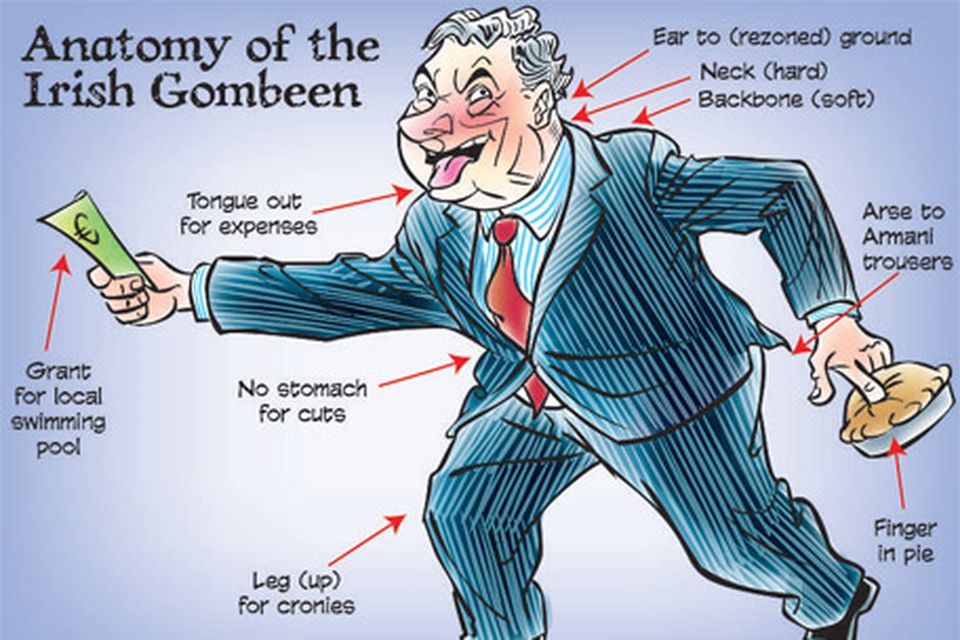
So, what is a Gombeen man? In Irish slang, a Gombeen man is a shady, small-time wheeler-dealer, a profiteer who thrives on the desperation of others. We all know them, they live amongst us emitting the foul stinking odour of unadulatered greed.
The term, rooted in the Irish word “gaimbín” (meaning monetary interest or usury), describes a predator who exploits his own people for personal gain.
Think of a shopkeeper during the Great Famine, charging ruinous interest for a handful of grain to starving families, or a modern landlord hiking rents to bleed tenants dry while pocketing government subsidies. The Gombeen insult carries the weight of centuries of betrayal, a label for those who’d sell their neighbors for a quick buck.
The Gombeen man origin lies in the Irish language, where “gaimbín” referred to usurious lending. By the 19th century, it had morphed into a term for those who profited off misery, particularly during the Famine, when Gombeen men were the middlemen who worked hand-in-glove with British landlords, squeezing the poor for every last penny.
Joseph Campbell’s poem, “The Gombeen Man,” captures this loathsome figure: “Behind a web of bottles, bales, Tobacco, sugar, coffin nails, The gombeen like a spider sits, Surfeited; and, for all his wits, As meagre as the tally-board, On which his usuries are scored.” This is no mere businessman; this is a leech, a spider weaving a web of debt and despair.
Gombeen Man Ireland: A Historical Rogues’ Gallery
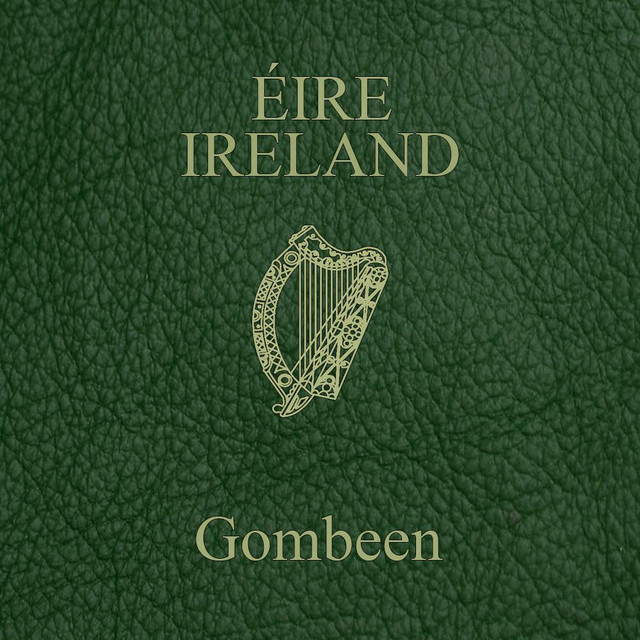
The Gombeen man Ireland has known is not a relic of the past but a recurring nightmare. During the Great Famine (1845–1852), Gombeen men were the shopkeepers and middlemen who exploited starving tenants, offering meager supplies on credit at exorbitant rates.
They were Irish, often Catholic, yet worked for the British landlords, profiting from the desperation of their own people.
James Connolly called them “leeches” who “sucked the life blood from the agricultural population.” G.W. Russell put it even more starkly: “The landlord owned the land. The gombeen men owned the people.”
Famous Gombeen men in Irish history are hard to pin down by name, as their infamy often cloaked them in anonymity, but their archetype is unmistakable.
Take the shopkeepers of the 19th century, who’d sell seed to farmers at usurious rates, knowing they’d never repay, only to seize their land when debts came due.
Or consider the “rancher” farmers, who, as Michael D. Higgins noted in 1982, fattened cattle for export while smallholders starved, wielding credit as a weapon to dominate rural communities.
In the 20th century, the label stuck to politicians like Albert Reynolds, dubbed a “classic gombeen man” by The Irish Times in 1996 for his alleged political cronyism and self-serving deals. Even Fergus Finlay, a Labour Party advisor, was branded a Gombeen for his role in the collapse of a coalition government, a backroom schemer pulling strings for power.
These figures weren’t just greedy; they were traitors to the Irish spirit, prioritizing profit over people, power over principle. Their legacy lingers in the modern Gombeen, who wears a sharper suit but carries the same rotten stinking heart.
The Modern Gombeen Man: Destroying Ireland in 2025
Fast forward to today, and the Gombeen man Ireland faces is more dangerous than ever.
Ireland’s housing crisis is a festering wound, with rents soaring, homelessness spiking, and young Irish families forced to emigrate while the government funnels resources to house migrants from across the globe.
The Gombeen men—and yes, Gombeen women—are at the heart of this betrayal. Landlords, developers, and politicians, bloated with wealth, are cashing in on a globalist agenda that prioritizes international optics over Irish lives. They’re not just profiting; they’re complicit in a cultural and economic suicide of the nation.
The housing crisis is a Gombeen’s wet dream. In 2025, Ireland’s government, led by the same tired boring old faces have failed to address the shortage of affordable homes.
Instead, they’ve opened the floodgates to mass immigration, housing thousands of newcomers while Irish families languish on waiting lists. In essence, the Irish economic system is based on what is one vast giant ponzi scheme.
The Gombeen landlords, many of whom sit in the Dáil, vote against tenants’ rights, hiking rents to obscene levels. They’re not serving Ireland; they’re serving globalist paymasters, from Brussels to Washington, who see nation-states as obstacles to a borderless, homogenized world.
These modern Gombeens are the foot soldiers of a globalist agenda that seeks to erode Ireland’s sovereignty and community. They take EU and IMF money, nod to multinational corporations, and turn a blind eye as Irish towns become unrecognizable.
The Gombeen insult fits them perfectly: they’re not just greedy; they’re mercenaries, paid to dismantle the very idea of Ireland as a nation. They are the scum of the earth. Their only virtue is money, their god is money, and they’ll sell their heritage, their people, and their future to the highest bidder.
They demand roads and sports pitches for their fiefdoms, yet turn a blind eye to the housing crisis that’s driving young Irish people out of their hometowns.
They’re the modern equivalent of the Famine-era shopkeeper, offering crumbs to their constituents while pocketing millions from government deals and foreign investors.
The Globalist Gombeen: Suiciding Ireland for Profit
The Gombeen man Ireland endures today is a puppet of globalism, a system that seeks to dissolve nation-states into a homogenized, corporate-controlled world.
The EU’s low-interest-rate policies in the early 2000s, as noted in The National, fueled Ireland’s property bubble, with Gombeen developers and bankers inflating prices until the 2008 crash left the nation in ruins.
Today, the same pattern repeats: Gombeen politicians and landlords exploit globalist policies to prioritize foreign investment and migration over Irish needs.
They’re paid to turn Ireland into a dormitory for the world, a place where Irish culture and community are sacrificed on the altar of profit.
These profiteers thrive on the housing crisis, leasing properties to the state for migrant accommodation at inflated rates while Irish families sleep in cars. They’re not just destroying communities; they’re erasing the very idea of Ireland as a sovereign nation, all for a paycheck from globalist institutions like the EU, UN, and the IMF. Their self centered egoism knows no bounds, their prayer and mantra is “Hail Mary full of bank account, blessed art thy bank account, and glory be to the euro, the cent, the pence, and whatever other shilling I can get me hands on.”
The Gombeen’s greed knows no bounds. They’re the landlords who evict Irish tenants to house asylum scam artists, pocketing government subsidies. Any thoughts on irrevocably alterting and fracturing the Irish nation along ethnic lines? Not a chance, the gombeen thinks of only one thing.
They’re the developers who build luxury apartments for foreign investors while affordable housing remains a pipe dream. They’re the politicians who parrot globalist buzzwords like “diversity” and “inclusion” while ignoring the cries of their own people.
Their actions are a slow-motion suicide of Ireland, a betrayal so profound it makes the Famine-era Gombeen look like a petty crook.
Famous Gombeen Men: The Faces of Betrayal

Throughout history, Ireland has suffered under Gombeen men who’ve left their mark like scars on the nation’s soul. In the 19th century, they were the shopkeepers and middlemen who profited from the Famine, immortalized in folklore as the “gombeen” who’d sell a potato for a pound of flesh.
In the 20th century, figures like Bertie Ahern, accused of cronyism and political fixing, earned the Gombeen insult for their self-serving antics. Even literary giants like James Joyce referenced the Gombeen, applying the term to an Irish Jewish man in Ulysses, showing how the label transcended religion to target anyone who exploited their own.
In modern times, the Gombeen class is less about individuals and more about a systemic rot. Many modern politicians reek of hollow promises, embodying the Gombeen spirit, clinging to power while the housing crisis festers.
These are the faces of betrayal, the Gombeen men and women who’d rather see Ireland burn than lose a euro.
The Gombeen Woman: A Rare but Deadly Breed
While the term is traditionally male, the Gombeen woman exists, lurking in the shadows of Ireland’s elite. As gombeenisland.wordpress.com notes, these women often gravitate to professions like landlordism, particularly in affluent areas like Dublin 4 or West Cork.
They’re harder to spot, cloaked in respectability, but their greed is just as lethal. During the Celtic Tiger era, their numbers grew, profiting from the property boom while ordinary Irish families were priced out.
Today, they’re the developers and politicians who push globalist policies, leasing properties for migrant housing while ignoring the homeless Irish. Their betrayal is no less vile for being less visible.
Gombeen Pronunciation and Etymology: The Word Itself
For those wondering, Gombeen pronunciation is straightforward: “gom-BEEN.” The word rolls off the tongue like a curse, carrying the weight of centuries of exploitation. The Gombeen etymology traces back to the Irish “gaimbín,” meaning interest or usury, a term that captures the parasitic nature of these profiteers. As Wiktionary notes, it’s a word that’s evolved from describing moneylenders to encompassing anyone—politician, landlord, or businessman—who puts profit over people.
FAQs: Unpacking the Gombeen Menace
What is a Gombeen in Irish Slang?
In Irish slang, a Gombeen is a derogatory term for a shady, self-serving individual, often a businessman or politician, who exploits others for profit. It’s rooted in the idea of usury, describing those who thrive on the desperation of their own people. Think of a landlord gouging tenants or a politician taking bribes for favors.
What is a Gombeen Urban Dictionary?
Urban Dictionary doesn’t have a specific entry for “Gombeen,” but the term aligns with its Irish usage: a corrupt, greedy individual who prioritizes personal gain over community welfare. It’s often used to describe politicians or landlords who exploit crises like housing shortages for profit.
What was a Gombeen During the Irish Famine?
During the Great Famine (1845–1852), a Gombeen was a shopkeeper or middleman who profited by selling food and goods to starving Irish families at exorbitant prices, often on credit with crippling interest rates. They worked with British landlords, exploiting the poor and contributing to the misery of the era.
How Do You Pronounce Gombeen?
Gombeen is pronounced “gom-BEEN,” with the emphasis on the second syllable. It’s a word that carries a sting, meant to be spat with contempt.
What is a Gombeen Man?
A Gombeen man is a pejorative term for a small-time, unscrupulous businessman or politician in Ireland who seeks quick profits, often through shady means like usury or bribery. Historically, they were Famine-era profiteers; today, they’re landlords and politicians exacerbating the housing crisis for personal gain.
What is a Gobshite in Irish Slang?
A gobshite is another Irish insult, referring to a foolish, loudmouthed person who talks nonsense or acts irresponsibly. Unlike the Gombeen, who’s calculating and greedy, a gobshite is more about stupidity and bluster. Think of a pub loudmouth or a politician spouting empty promises.
The Gombeen’s Legacy: A Nation on Its Knees
The Gombeen man is no mere historical curiosity; he’s a living, breathing cancer in Ireland’s heart. From the Famine to the housing crisis of 2025, these parasites have bled the nation dry, selling its soul for a handful of euros.
They’re the landlords who evict Irish families to house migrants for profit, the politicians who bow to Brussels while their constituents sleep on the streets, the developers who build glass towers for foreign investors while Irish youth flee abroad. Their only virtue is money, and they’ll burn Ireland to the ground to get it.
The Gombeen Irish spirit is one of betrayal, a betrayal that’s been centuries in the making. A vile piece of human filth.
Today, it’s time for the Irish people to rise again, to call out these profiteers, to demand a nation that puts its own first. The Gombeen man may think he owns Ireland, but in reality the only thing they really own are souls as dark and black as in the foulest pits of hell.

